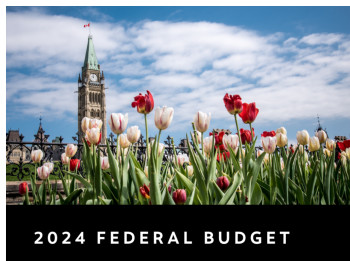🎓 Exciting Announcement! 🎓
  

We are thrilled to share the wonderful news that our eldest son has been accepted into Arizona Christian University's Bachelor in Business Administration program with a Major in Entrepreneurship! What's more, he has been awarded a baseball scholarship to continue playing as a catcher for the well known ACU Firestorm team.
We couldn't be prouder of his accomplishments and the bright future that lies ahead. Please join us in wishing him all the best as he gears up for this exciting adventure, with his move to Arizona scheduled for August.
Budget 2024 housing highlights: capital gains inclusion rate on secondary homes rises to 66.7%
  

Housing was a key priority in today’s federal budget, though it came as no surprise given the array of housing-related policy announcements unveiled in recent weeks.
The 2024 budget included $52.9 billion in new spending plans, which will result in a projected deficit of $39.8 billion this fiscal year before gradually declining to $20 billion by 2028-29.
Many of the budget’s commitments are focused on easing the affordability challenges facing young Canadians, particularly when it comes to achieving homeownership.
Conversely, many of the new tax announcements are aimed at wealthier Canadians.
Change to capital gains inclusion rate
One new measure unveiled today that will impact some real estate transactions was the increase to the capital gains inclusion rate. This applies to annual gains above $250,000 for individuals and to all gains for corporations and trusts.
The new rate rises from 50% to 66.7% for dispositions on or after June 25, 2024, including sales of non-principal residences (such as vacation homes or investment properties).
The budget reaffirmed that sales of principal residences “will remain fully exempt from the tax on capital gains.”
Roughly 4.4 million Canadians (11%) own at least two homes, according to 2023 research from Royal LePage.
Let’s say you own a second vacation home that you originally bought for $200,000 and you sell it for $500,000. The profit you made from the sale is $300,000.
Under the previous tax rules, you would include 50% of your $300,000 gain in your taxable income for the year. That means you would pay taxes on $150,000 of your profit.
With the new tax rules, the capital gains inclusion rate has increased to 66.7%. This means you now have to include 66.7% for annual gains above $250,000. This means you still include 50% of the first $250,000 and 66.7% of your next $50,000 gain in your taxable income, meaning you would pay taxes on $158,350 of your profit.
Taxable amount for the first $250,000: 250,000 × 0.50 = $125,000Taxable amount for the next $50,000: 50,000 × 0.667 = $33,350Total taxable amount: $158,350
Other housing announcement highlights
The Liberal government unveiled numerous initiatives and policy announcements in the past several weeks. This included the release of its 28-page housing strategy entitled ‘Solving the housing crisis: Canada’s Housing Plan.’
Among some of the highlights of those announcements:
30-year amortizations for some first-time buyers: Starting August 1, the maximum amortization will be raised from 25 to 30 years for first-time buyers purchasing a new-build property with a down payment of less than 20% (an insured mortgage). The government also proposed changes to the Canadian Mortgage Charter that would allow permanent amortization relief for qualifying existing homeowners.
Increase to the Home Buyers’ Plan limit:Starting today, first-time buyers will be able to withdraw up to $60,000 (previously $35,000) from their Registered Retirement Savings Plan (RRSP) tax-free for the purchase of their first home. This includes an extension of the grace period to start repaying the loan by an additional three years.
Additional protections for renters in the form of a Canadian Renters’ Bill of Rights. This includes the launch of a Tenant Protection Fund and leveraging rental payment history to improve credit scores.
Housing Accelerator Fund increase: A $400-million top-up to this $4-billion fund.
A plan to build 3.87 million new homes by 2031, including 2 million net new homes in addition to the 1.87 million homes that the Canada Mortgage and Housing Corporation forecasts will be built by that year.
The launch of Canada Builds, a program that combines federal low-cost loans with provincial and territorial investments to scale up the construction of rental homes on under-utilized lands.
$10 million invested in the Skilled Trades Awareness and Readiness program to motivate high school students to pursue careers in the skilled trades.
$50 million directed to the Foreign Credential Recognition Program, specifically to support residential construction and assist skilled trades workers in building more homes.
$90 million for the Apprenticeship Service, to create apprenticeship opportunities to train and recruit the next generation of skilled trades workers.
Modernizing housing data: $20 million for Statistics Canada and CMHC to modernize and enhance the collection and dissemination of housing data, including municipal-level data on housing starts and completions.
Cracking down on mortgage and real estate fraud: The government said it plans to consult with the mortgage industry on developing income verification toolsthrough the Canada Revenue Agency.
|